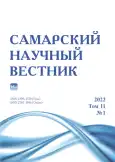Киберсоциализация как фактор адаптации студентов вуза к условиям дистанционного обучения
- Авторы: Буренина С.Ю.1, Калинина С.Б.1
-
Учреждения:
- Псковский государственный университет
- Выпуск: Том 11, № 1 (2022)
- Страницы: 281-287
- Раздел: Педагогические науки
- URL: https://journals.rcsi.science/2309-4370/article/view/108357
- DOI: https://doi.org/10.55355/snv2022111303
- ID: 108357
Цитировать
Полный текст
Аннотация
В данной статье рассматривается актуальная на сегодняшний день проблема киберпространства, которое становится полем для обсуждения как политических, экономических, социальных проблем, так и проблем, касающихся вопросов личной жизнедеятельности, процессов обучения и развития. Процесс стихийной социализации, где агентами традиционно выступали институты семьи и образования, усложняется современными мировыми информационными компьютерными технологиями, что естественно привело к киберэволюции. Рассматривается необходимость вхождения в киберпространство сферы образования. Описывается необходимость включения студенческого сообщества в процесс обучения посредством онлайн-технологий с использованием современных платформ обучения (Moodle, Microsoft Teams и др.). В работе рассматривается феномен киберсоциализации как основной фактор социально-педагогической адаптации студентов, с необходимостью выхода на позитивную киберсоциализацию. Особый акцент делается на положительные аспекты киберсоциализации студентов, и изучаются проблемы адаптации студентов к условиям дистанционного обучения. В работе представлены результаты разработки и реализации социально-педагогической программы адаптации студентов к условиям дистанционного обучения. Проведенные исследования показали ориентированность студентов на дистанционный формат обучения, где определенная роль отводится кураторам учебных групп и преподавателям при решении проблем киберсоциализации студентов. При этом важна самостоятельность и мотивированность самих студентов в решении данной проблемы. Полученные материалы могут служить основой для понимания процесса социализации современного студента к условиям дистанционного образования.
Полный текст
Открыть статью на сайте журналаОб авторах
Светлана Юрьевна Буренина
Псковский государственный университет
Email: lanabur@yandex.ru
кандидат педагогических наук, доцент кафедры среднего общего образования и социального проектирования
Россия, ПсковСветлана Борисовна Калинина
Псковский государственный университет
Автор, ответственный за переписку.
Email: sv_kalinina@mail.ru
кандидат педагогических наук, заведующий кафедрой среднего общего образования и социального проектирования
Россия, ПсковСписок литературы
- Об утверждении Основ государственной молодежной политики Российской Федерации на период до 2025 года: распоряжение Правительства РФ от 29.11.2014 № 2403-р [Электронный ресурс] // Электронный фонд правовых и нормативно-технических документов. https://docs.cntd.ru/document/420237592.
- Баландицева Т.В. Методика педагогической адаптации учащихся профессионального лицея: автореф. дис. … канд. пед. наук. Йошкар-Ола, 2003. 18 с.
- Елгина Л.С. Социальная адаптация студентов в вузе // Вестник Бурятского государственного университета. 2010. № 5. С. 162-166.
- Лагерев В.В. Адаптация студентов к условиям обучения в техническом вузе и особенности организации учебно-воспитательного процесса с первокурсниками. М.: НИИВО, 1991. 48 с.
- Магомедова М.Г. Адаптация личности студента к образовательному процессу как социокультурное явление и педагогический процесс // Мир науки, культуры, образования. 2018. № 2 (69). С. 51-53.
- Магомедова М.Г. Модель управления адаптацией студентов вуза в контексте формирования профессионально-педагогической культуры // Известия Дагестанского государственного педагогического университета. Психолого-педагогические науки. 2017. № 4. С. 88-93.
- Осипчукова Е.В. Организационно-педагогические условия адаптации студентов к образовательному процессу технического вуза: автореф. дис. … канд. пед. наук. Екатеринбург, 2009. 30 с.
- Смыслова Н.М. Социально-педагогическая адаптация студентов образовательных учреждений среднего профессионального образования: автореф. дис. … канд. пед. наук. Киров, 2012. 21 с.
- Белова Е.С. Социализация студента высшего учебного заведения в условиях дистанционного обучения [Электронный ресурс] // Современные проблемы науки и образования. 2015. № 5. https://science-education.ru/ru/article/view?id=22196.
- Олейник Е.В., Муталова Д.А., Безенкова Т.А., Мананникова А.В. Изучение проблемы адаптации студентов вуза в условиях самоизоляции к on-line обучению с применением дистанционных образовательных технологий // Современное педагогическое образование. 2020. № 5. С. 69-72.
- Кучер О.Н. Варианты включения дистанционных образовательных технологий, электронного обучения в учебный процесс вуза [Электронный ресурс] // Современные проблемы науки и образования. 2017. № 5. https://science-education.ru/ru/article/view?id=27008.
- Плешаков В.А. Интеграция, киберсоциализация и социальное воспитание: студент и преподаватель в информационном пространстве // Педагогическое образование и наука. 2010. № 1. С. 27-31.
- Плешаков В.А. Киберсоциализация человека: от Homo sapiens’а до Homo cyberus’а. М.: Прометей, 2012. 212 с.
- Чванова М.С., Анурьева М.С., Киселева И.А. Влияние интернета на социализацию молодежи // Вестник Тамбовского университета. Серия: Гуманитарные науки. 2017. Т. 22, № 5 (169). С. 23-36. doi: 10.20310/1810-0201-2017-22-5(169)-23-36.
- Айсина Р.М., Нестерова А.А. Киберсоциализация молодежи в информационно-коммуникационном пространстве современного мира: эффекты и риски // Социальная психология и общество. 2019. Т. 10, № 4. С. 42-57. doi: 10.17759/sps.2019100404.
- Никитина С.В. Формирование ценностных ориентаций молодежи в процессе киберсоциализации // Россия и мировые тенденции развития: мат-лы всерос. науч.-практ. конф. с междунар. участием, Омск, 13-15 мая 2019 года / науч. ред. П.Г. Макухин. Омск: Омский государственный технический университет, 2019. С. 222-228.
- Верейкина С.Н. О критериях успешности, успешной социализации и киберсоциализации личности // Преподаватель ХХI век. 2018. № 1-1. С. 81-87.
- Балыкина А.М., Плешаков В.А. О внедрении современных технологий профессиональной киберсоциализации студентов [Электронный ресурс] // Современные проблемы науки и образования. 2014. № 6. https://science-education.ru/ru/article/view?id=17041.
- Chitosca M.I. The Internet as a socializing agent of the «M Generation» // Journal of Social Informatics. 2006. Vol. 5. P. 3-21.
- Бондаренко С.В. Социальная структура виртуальных сетевых сообществ. Ростов-на-Дону: Изд-во Рост. ун-та, 2004. 320 с.
- Воинова О.И., Плешаков В.А. Киберонтологический подход в образовании: монография. Норильск: Норильский индустр. ин-т, 2012. 244 с.
- Ионова В.А., Подопригора Е.В. Об индустрии квест-игр и квесте в реальности «Человек VS Интернет» [Электронный ресурс] // Электронный научно-публицистический журнал «Homo Cyberus». 2016. № 1. http://journal.homocyberus.ru/Ionova_podoprigora_chelovek_vs_internet.
Дополнительные файлы












